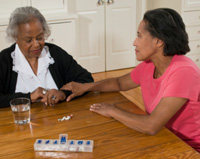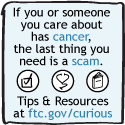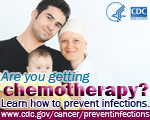Basic Information About Cancer Survivorship
Who Are Cancer Survivors?

The term "cancer survivor" refers to an individual who has been diagnosed with cancer, from the time of diagnosis throughout his or her life. The impact of cancer on family members, friends, and caregivers of survivors is also acknowledged as part of survivorship.
The Burden of Cancer Survivorship
Due to advances in the early detection and treatment of cancer, people are living many years after a diagnosis. In January 2007, about 11.7 million people with a previous diagnosis of cancer were living in the United States.1 Approximately 66% of people diagnosed with cancer are expected to live at least five years after diagnosis.1 However, disparities in health care impact survival. Low-income men and women who have inadequate or no health insurance coverage are more likely to be diagnosed with cancer at later stages, when survival times are shorter.2
Cancer survivors may face physical, emotional, social, spiritual, and financial challenges as a result of their cancer diagnosis and treatment. Public health professionals strive to address survivorship and quality of life issues such as the coordination of care, patient-provider communication, health promotion, support services, and fertility preservation. In light of these concerns, public health initiatives aimed at understanding and preventing secondary disease, recurrence, and the long-term effects of treatment are essential.
Promoting Health After a Cancer Diagnosis
Cancer survivors are at greater risk for recurrence and for developing second cancers due to the effects of treatment, unhealthy lifestyle behaviors, underlying genetics, or risk factors that contributed to the first cancer.3 The following factors can help maintain health and improve survival and quality of life after a cancer diagnosis—
- Quitting Tobacco Use
- SmokingSmoking is a preventable risk factor for cancer recurrence and additional cancers.4
- Being Active and Maintaining a Healthy Weight
- Discussing Follow-up Care with a Health Care Provider
Important topics to discuss—- A follow-up plan of care that includes a schedule of recommended follow-up visits, screenings, and medical tests and specifies which providers will be responsible for care.12
- Possible delayed effects of treatment.13
- The importance of seeking timely care in response to certain signs or symptoms.
- Emotional wellness after cancer and identifying available resources for additional support, if necessary.
- Lifestyle changes recommended for improving health and well-being after cancer.
- Developing an effective support system that meets survivors' medical and emotional needs.14
References
1Centers for Disease Control and Prevention (CDC). Cancer survivors—United States, 2007. MMWR 2011;60(9):269–272.
2Schwartz KL, Crossley-May H, Vigneau FD, Brown K, Banerjee M. Race, socioeconomic status and stage at diagnosis for five common malignancies. Cancer Causes & Control 2003;14(8):761–766.
3Ganz PA. Late effects of cancer and its treatment. Seminars in Oncology Nursing 2001;17:241–248.
4Khuri FR, Kim ES, Lee JJ, Winn RJ, Benner SE, Lippman SM, Fu KK, Cooper JS, Vokes EE, Chamberlain RM, Williams B, Pajak TF, Goepfert H, Hong WK. The impact of smoking status, disease stage, and index tumor site on second primary tumor incidence and tumor recurrence in the head and neck retinoid chemoprevention trial. Cancer Epidemiology, Biomarkers and Prevention 2001;10(8):823–829.
5Whiteman MK, Hillis SD, Curtis KM, McDonald JA, Wingo PA, Marchbanks PA. Body mass and mortality after breast cancer diagnosis. Cancer Epidemiology, Biomarkers and Prevention 2005;14(8):2009–2014.
6Loi S, Milne RL, Friedlander ML et al. Obesity and outcomes in premenopausal and postmenopausal breast cancer. Cancer Epidemiology, Biomarkers and Prevention 2005;14(7):1686–1691.
7Kroenke CH, Chen WY, Rosner B, Holmes MD. Weight, weight gain, and survival after breast cancer diagnosis. Journal of Clinical Oncology 2005;23(7):1370–1378.
8Bassett WW, Cooperberg MR, Sadetsky N, Silva S, DuChane J, Pasta DJ, Chan JM, Anast JW, Carroll PR, Kane CJ. Impact of obesity on prostate cancer recurrence after radical prostatectomy: data from CaPSURE. Urology 2005;66(5):1060–1065.
9Freedland SJ, Grubb KA, Yiu SK, Humphreys EB, Nielsen ME, Mangold LA, Isaacs WB, Partin AW. Obesity and risk of biochemical progression following radical prostatectomy at a tertiary care referral center. Journal of Urology 2005;174(3):919–922.
10Haydon AMM, MacInnis RJ, English DR, Giles GG. Effect of physical activity and body size on survival after diagnosis with colorectal cancer. Gut 2006;55:62–67.
11Doyle C, Kushi LH, Byers T, Courneya KS, Demark-Wahnefried W, Grant B, McTiernan A, Rock CL, Thompson C, Gansler T, Andrews KS. The 2006 Nutrition, Physical Activity and Cancer Survivorship Advisory Committee; American Cancer Society. Nutrition and physical activity during and after cancer treatment: An American Cancer Society guide for informed choices. CA: A Cancer Journal for Clinicians 2006;56:323–353.
12Earle CC. Failing to plan is planning to fail: Improving the quality of care with survivorship care plans. Journal of Clinical Oncology 2006;24(32):5112–5116.
13Haylock PJ, Mitchell SA, Cox T, Temple SV, Curtiss CP. The cancer survivor's prescription for living. American Journal of Nursing 2007;107(4):58–70.
14Kroenke CH, Kubzansky LD, Schernhammer ES, Holmes MD, Kawachi I. Social networks, social support, and survival after breast cancer diagnosis. Journal of Clinical Oncology 2006;24(7):1105–1111.

Contact Us:
- Centers for Disease Control and Prevention
Division of Cancer Prevention and Control
4770 Buford Hwy NE
MS K-64
Atlanta, GA 30341 - 800-CDC-INFO
(800-232-4636)
TTY: (888) 232-6348
8am–8pm ET
Monday–Friday
Closed on Holidays - cdcinfo@cdc.gov



